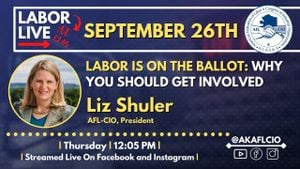Mikhail Kavelashvili, the former football player and member of the Georgian Dream party, has been elected as the new President of Georgia following elections held on December 14, 2024. This election marks the first time since constitutional reforms were enacted, shifting from direct public voting to an electoral college system involving 300 members.
With Kavelashvili as the sole candidate, he received 224 votes from the electoral college, thereby easily surpassing the required 200 votes needed to win outright, with one ballot deemed invalid. This streamlined process unfolded smoothly, though against the backdrop of significant political tension and widespread protests questioning the legitimacy of the ruling party.
Kavelashvili, 53, is not just known for his political ascent; his career as a professional football player is noteworthy. He made his mark by playing with teams such as Tbilisi's Dinamo and the national team of Georgia. His stellar career included winning multiple championships and even playing for clubs like Manchester City and the Swiss team Grasshopper. Having transitioned to politics, he was first elected to parliament with the Georgian Dream party back in 2016, later co-founding the faction known as the Strength of the People, which is recognized for its traditionalist and anti-Western rhetoric.
The election process itself has been controversial. According to reports, the opposition parties boycotted these elections after disputing the validity of the preceding parliamentary elections held back in October, which they deemed rigged. Consequently, they did not present any candidate to rival Kavelashvili, leading to this unusual electoral climate.
Current President Salome Zourabichvili, instead of gracefully exiting as her term nears its end on December 29, has openly challenged these elections. "No one has elected anyone... Nothing happened, I continue my work," she stated, indicating her refusal to step down or acknowledge Kavelashvili's victory. Zourabichvili, set to leave her position, referred to the election as "a mockery of democracy" and maintains her stance against both the electoral process and the ruling government.
This juxtaposition between the outgoing president's claims and Kavelashvili's supporters paints a vivid picture of the political divisions within Georgia. Irakli Kobakhidze, the Prime Minister, remarked, "The radical opposition lost first the elections, then the streets," implying the government's perceived strength over the political dissenters.
The protests gathered momentum at the parliament building, drawing hundreds of demonstrators who call for changes and accountability from the government. Many wore distinctive academic hats symbolizing the lack of higher education of the new president, stirring critiques about his qualifications. These protests featured significant participation from opposition party members and civil society groups who questioned Kavelashvili’s suitability for the presidency.
Missing from the political equation is any cohesive opposition muscle, with multiple party leaders expressing skepticism about the current state of democracy within Georgia. They argue the structure of the electoral college restricts the electorate's choices and undermines the democratic process. The mood remains charged as protests target the heart of governance.
Meanwhile, celebrations among Kavelashvili's supporters mark his election, with the ruling party emphasizing their mandate to lead the country. The Georgian Dream party views his presidency as pivotal to continuing their political agenda, focusing on patriotism and emphasizing traditional values.
Moving forward from these elections, Georgia stands at a crossroads. The new president's tenure, beginning officially on December 29, is anticipated to be fraught with challenges, particularly with growing dissent and the likelihood of continued protests against governmental policies and actions.
With Kavelashvili's anti-Western rhetoric and the political shift possible, many question Georgia's future direction. Will the country, under his leadership, attempt to mend ties with the West or will it sway toward more radical sentiments? The forthcoming months will reveal much about the future of Georgian politics and the reactions of its populace to the election's outcomes.



